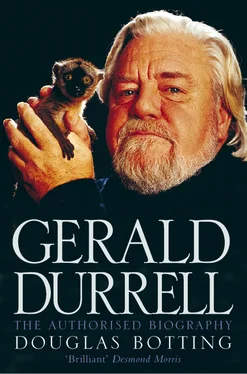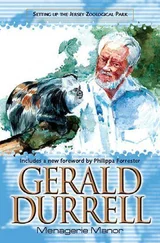‘My brother Larry was a kind of god for me,’ Gerald recalled, ‘and therefore I tried to imitate him. Larry had people like Henry Miller staying with him in Corfu and I had access to his very varied library.’ Larry would throw books at him, he remembered, with a brief word about why they were interesting, and if Gerald thought he was right he’d read them. ‘Good heavens, I was omnivorous! I read anything from Darwin to the unexpurgated Lady Chatterley’s Lover . I adored books by W.H. Hudson, Gilbert White and Bates’ A Naturalist on the River Amazons . I believe that all children should be surrounded by books and animals.’ It was Lawrence who gave his young brother copies of Henri Fabre’s classic works Insect Life: Souvenirs of a Naturalist and The Life and Love of the Insects , with their accounts of wasps, bees, ants, gnats, spiders, scorpions – books which Gerald was later to claim ‘set me off on Corfu’, and which remained an inspiration throughout his life on account of the simplicity and clarity with which they were written and the stimulation they provided the imagination. He was to write:
If someone had presented me with the touchstone that turns everything to gold, I could not have been more delighted. From that moment Fabre became my personal friend. He unravelled the many mysteries that surrounded me and showed me miracles and how they were performed. Through his entrancing prose I became the hunting wasp, the paralysed spider, the cicada, the burly, burnished scarab beetle, and a host of other creatures as well.
Ironically, though, it was a publication that Gerald borrowed from his highly unliterary, gun-slinging brother Leslie that was to sound the clearest call to action for his future life. This was a copy of a popular adventure magazine called Wide World , which serialised a refreshingly humorous account by an American zoologist, Ivan Sanderson, about a recent animal-collecting expedition, led by Percy Sladen, in the wilds of the Cameroons in West Africa. Sanderson’s beguiling tale planted a dream inside Gerald’s young skull, a dream which hardened into a youthful vow of intent that one day he too would combine his love of animals with his yearning for adventure and brave the African wilds in search of rare animals – animals which he would bring back alive, not trapped, shot and stuffed like Percy Sladen’s.
Lawrence’s greatest gift to Gerald was not printed books but language itself, especially language at its most evocative and illuminating, in the form of simile and metaphor. Judging by the progression from Gerald’s earliest literary offerings to those that followed, the impact of his brother’s tuition was electrifying. It was as if Gerald had grown up in a year, emerging by the summer of 1936, when he was eleven, with the perception of someone three times his age. If his next poem, ‘Death’, was not written by Lawrence, the influence of Lawrence totally dominates it, from the subject to the prosody. And the transformation in Gerald’s spelling is suspiciously miraculous.
on a mound a boy lay
as a stream went tinkling by:
mauve irises stood around him as if to
shade him from the eye of death which
was always taking people unawares
and making them till his ground
rhododendrons peeped
at the boy counting sheep
the horror is spread
the boy is dead
BUT DEATH HIMSELF IS NOT SEEN
Lawrence was so impressed by the poem that he sent a copy of it to his friend Henry Miller in America, naming his younger brother as the author. ‘He has written the following poem,’ he wrote. ‘And I am envious.’ Later he included the poem in the November 1937 issue of the Booster , the controversial literary magazine of the American Country Club near Paris, which he edited with Miller, Alfred Pérles and William Saroyan.
By now Mother had found Gerald a new tutor to take the place of George Wilkinson, who had remained at Pérama. He was a twenty-two-year-old friend of Lawrence’s by the name of Pat Evans, ‘a tall, handsome young man,’ Gerald noted, ‘fresh from Oxford.’ Evans entertained serious ambitions of actually educating his young pupil, an aim Gerald himself found ‘rather trying’ and did his best to subvert. He need not have worried, however, for soon the island began to work its languorous magic on the new arrival, and all talk of fractions and adverbs and suchlike was abandoned in favour of a more outdoor kind of teaching, like floating about in the sea while chatting in a desultory way about the effects of warm ocean currents and the origins of coastline geology. Evans had a keen interest in natural history and biology, and he passed on his enthusiasm to his young pupil in a casual, unobtrusive way, ‘walking around, just looking at bugs’, as Margo recalled.
Gerald persuaded Pat Evans to let him write a book as a substitute for English lessons, and soon he was busy scribbling away at a narrative he was to describe as ‘a stirring tale of a voyage round the world capturing animals with my family’, a work Lawrence called ‘his great novel of the flora and fauna of the world’ – a story written very much in the style of the Boy’s Own Paper , with one chapter ending with Mother being attacked by a jaguar and another with Larry caught in the coils of a giant anaconda. Unfortunately, the manuscript was inadvertently left behind in a tin trunk when the family finally left the island, and was probably impounded (so Gerald reckoned) by a bunch of Nazi illiterates during the war and thus lost to posterity for ever.
One fragment of Gerald’s early writing that did survive was a remarkable prose poem, ‘In the Theatre’, which Lawrence also published in the Booster – it was, indeed, Gerald’s first published work. It was clear from ‘In the Theatre’ that Gerald shared with his eldest brother an aptitude for vivid, concrete imagery and the instinct for simile and metaphor which lies at the heart of all poetic vision – much of it drawn from the wildlife the boy had been observing at first hand in his rambles around Corfu.
They brought him in on a stretcher, starched and white, every stitch of it showing hospital work. They slid him on to the cold stone table. He was dressed in pyjamas and jacket, his face looked as if it was carved out of cuttlefish. A student fidgeted, someone coughed, huskily, uneasily. The doctor looked up sharply at the new nurse: she was white as marble, twisting a blue lace handkerchief in her butterfly-like hands.
The scalpel whispered as if it were cutting silk, showing the intestines coiled up neatly like watchsprings. The doctor’s hands moved with the speed of a striking snake, cutting, fastening, probing. At last, a pinkish-grey thing like a sausage came out in the scorpion-like grip of the pincers. Then the sewing-up, the needle burying itself in the soft depth and appearing on the other side of the abyss, drawing the skin together like a magnet. The stretcher groaned at the sudden weight.
When Lawrence first read this prose-poem with his eleven-year-old brother’s name appended to it, he thought it must have been his tutor Pat Evans who had really written it. But Evans denied any involvement. ‘Do you suppose,’ he told Lawrence, ‘that if I could write as well as that I would waste my time on being a tutor?’
But Pat Evans clearly was an inciting agent of some sort in Gerald’s literary development, for later in the year Gerald wrote to Alan Thomas enclosing a copy of his most recent poetic concoction:
I send you my latest opus. Pat and I set each other subjects to write poems in each week. This is my first homewark [sic]. NIGHT-CLUB.
Spoon on, swoon on to death. The mood is blue.
Croon me a stave as sexless as the plants,
Deathless as platinum, cynical as love.
Читать дальше










